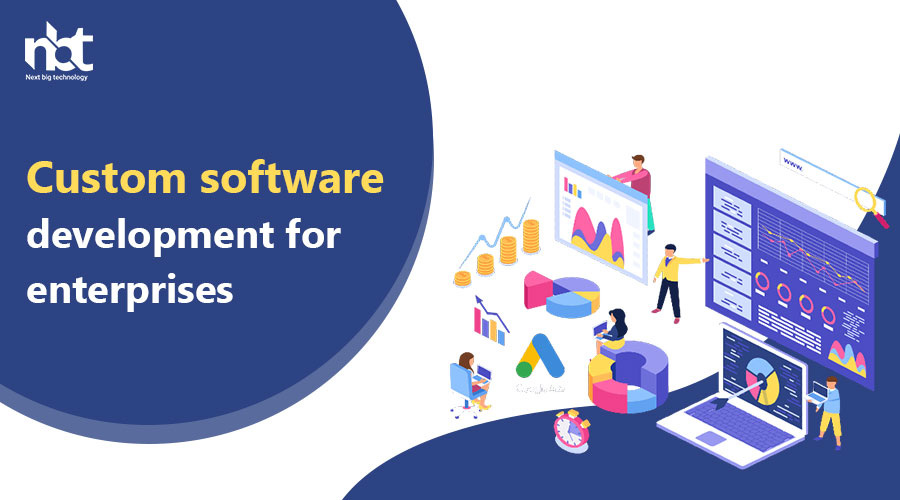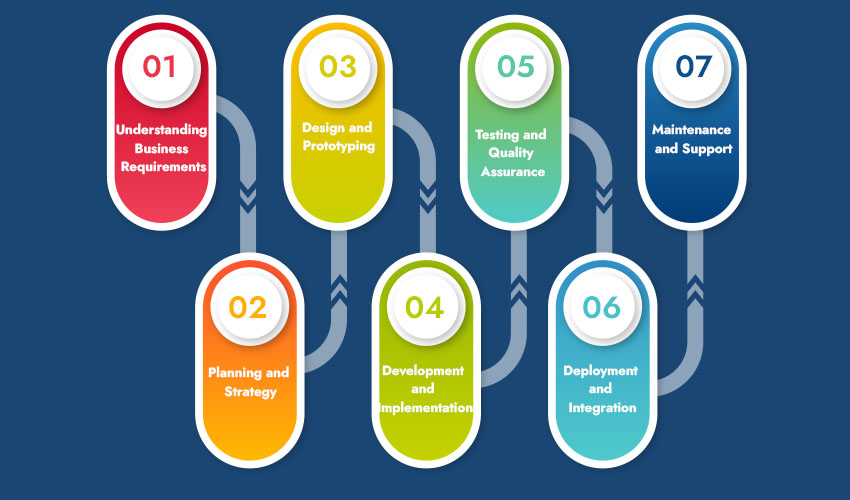Table of Contents
Custom software development for enterprises Services
In the fast-paced world of modern business, enterprises face a myriad of challenges that demand innovative solutions for sustainable growth and success. One such solution that has emerged as a game-changer is custom software development services. Tailored specifically to the unique needs and objectives of an enterprise, these services offer a plethora of benefits that can significantly enhance operational efficiency, productivity, and competitiveness.
Custom software development for enterprises involves the creation of bespoke software solutions that are designed to address specific business requirements. Unlike off-the-shelf software, which may offer generic functionality, custom solutions are crafted to seamlessly integrate with existing systems and workflows, providing a tailored approach to streamlining processes and maximizing ROI.
One of the primary advantages of custom software development services is their ability to address the unique challenges and complexities faced by enterprises across various industries. Whether it’s automating repetitive tasks, optimizing resource allocation, or enhancing data management and analysis, custom solutions can be designed to meet the precise needs of an organization, leading to improved efficiency and performance.
Moreover, custom software development allows enterprises to stay ahead of the curve in an increasingly competitive market landscape. By harnessing the latest technologies and trends, such as artificial intelligence, machine learning, and blockchain, custom solutions enable businesses to innovate and differentiate themselves from their competitors. This not only enhances their market position but also fosters long-term growth and sustainability.
Furthermore, custom software development services offer scalability and flexibility, allowing enterprises to adapt to evolving business requirements and market dynamics. Whether it’s scaling up operations to accommodate growth or integrating new features and functionalities, custom solutions can be easily modified and expanded to align with changing needs, ensuring continued relevance and effectiveness.
From improved decision-making to enhanced customer experiences, the benefits of custom software development for enterprises are manifold. By investing in tailored solutions that are aligned with their unique objectives and challenges, businesses can unlock new opportunities for growth, innovation, and success in today’s digital age.
How to Create a Custom software development for enterprises
In today’s fast-paced digital landscape, enterprises are constantly seeking innovative solutions to streamline their operations, enhance efficiency, and stay ahead of the competition. One of the most effective ways to achieve these goals is through custom software development tailored specifically to their unique needs and requirements. In this comprehensive guide, we’ll walk you through the process of creating custom software solutions for enterprises, from inception to implementation.
- Understanding Enterprise Needs: The first step in creating custom software for enterprises is gaining a deep understanding of their specific requirements, challenges, and objectives. This involves conducting thorough research, gathering insights from key stakeholders, and analyzing existing systems and processes.
- Defining Project Scope and Goals: Once you have a clear understanding of the enterprise’s needs, it’s essential to define the scope and goals of the project. This involves outlining the features and functionalities the custom software will need to encompass, as well as establishing timelines and budget constraints.
- Designing the Solution: With the project scope and goals in place, the next step is to design the custom software solution. This involves creating wireframes, mockups, and prototypes to visualize the user interface and user experience. Collaboration between designers, developers, and stakeholders is crucial during this phase to ensure alignment with the enterprise’s vision.
- Development and Testing: Once the design is finalized, the development phase begins. Skilled developers will work to bring the software to life, writing code, integrating third-party APIs, and implementing necessary functionalities. Throughout the development process, rigorous testing is conducted to identify and fix any bugs or issues that may arise.
- Integration and Deployment: After thorough testing and quality assurance, the custom software solution is ready for integration into the enterprise’s existing systems and infrastructure. This may involve migrating data, setting up user accounts, and configuring permissions. Once integration is complete, the software is deployed for use by end-users.
- Training and Support: Even the most well-designed custom software solution will require training and support for end-users to maximize its effectiveness. Providing comprehensive training sessions and ongoing support ensures that users are able to leverage the full capabilities of the software and address any issues that may arise.
- Continuous Improvement: The creation of custom software for enterprises is an ongoing process that requires continuous improvement and iteration. Gathering feedback from end-users and stakeholders, monitoring performance metrics, and staying abreast of technological advancements are essential for ensuring the long-term success and relevance of the software solution.
Why Should You Go for Custom software development for enterprises
In today’s dynamic business landscape, enterprises face ever-evolving challenges and complexities. To stay ahead of the competition and meet the diverse needs of their operations, many are turning to custom software development. While off-the-shelf solutions have their merits, the bespoke approach offers a myriad of benefits that can truly transform how enterprises operate and thrive in the digital age.
Tailored Solutions for Unique Needs: Off-the-shelf software may offer generic functionalities, but they often fall short when it comes to addressing the specific requirements of enterprises. Custom software development, on the other hand, allows businesses to create solutions that are precisely tailored to their unique needs, processes, and goals. Whether it’s streamlining internal workflows, enhancing customer experiences, or integrating disparate systems, bespoke software ensures a perfect fit.
Enhanced Efficiency and Productivity: One of the most significant advantages of custom software is its ability to boost efficiency and productivity within an enterprise. By automating repetitive tasks, eliminating manual errors, and providing intuitive user interfaces, bespoke solutions empower employees to focus on high-value activities. This streamlined approach not only saves time and resources but also enables enterprises to accomplish more in less time, driving overall productivity to new heights.
Scalability and Flexibility: As enterprises grow and evolve, their software requirements change accordingly. Off-the-shelf solutions may struggle to keep pace with this growth, leading to scalability issues and limitations. Custom software development, however, offers the flexibility to scale and adapt as the business expands. Whether it’s accommodating increased user loads, integrating new functionalities, or supporting additional platforms, bespoke solutions can effortlessly evolve alongside the enterprise, ensuring long-term relevance and sustainability.
Competitive Advantage: In today’s hyper-competitive market, differentiation is key to success. Custom software development provides enterprises with a unique competitive advantage by enabling them to innovate and differentiate themselves from the competition. By leveraging bespoke solutions to address specific pain points, deliver personalized experiences, or pioneer new capabilities, businesses can carve out a distinct identity and position themselves as leaders in their industry.
Greater Security and Control: Data security is a top priority for enterprises, especially in industries dealing with sensitive information. Off-the-shelf software poses inherent security risks, as they are more susceptible to vulnerabilities and may not meet the stringent security requirements of enterprises. Custom software development offers greater control over security measures, allowing businesses to implement robust encryption, access controls, and compliance protocols tailored to their specific needs. This enhanced security posture instills confidence among stakeholders and protects valuable assets from potential threats.
Market Prospects of Custom software development for enterprises and Platforms
In today’s rapidly evolving digital landscape, businesses are constantly seeking innovative solutions to streamline operations, enhance efficiency, and gain a competitive edge. Custom software development for enterprises and platforms has emerged as a pivotal tool in achieving these objectives. From tailored enterprise resource planning (ERP) systems to cutting-edge e-commerce platforms, the demand for bespoke software solutions is soaring across industries. Let’s delve into the market prospects of custom software development and explore why it presents a lucrative opportunity for both businesses and software developers alike.
- Rising Demand for Tailored Solutions: Enterprises are increasingly recognizing the limitations of off-the-shelf software solutions. These solutions often fail to address specific business requirements and lack scalability. Custom software development offers businesses the flexibility to design solutions tailored precisely to their needs. Whether it’s automating workflows, integrating disparate systems, or enhancing user experience, bespoke software enables enterprises to unlock greater value and efficiency.
- Diverse Industry Applications: The market for custom software development spans across various industries, including finance, healthcare, manufacturing, retail, and more. Each sector has unique challenges and opportunities that can be effectively addressed through customized software solutions. For instance, healthcare providers may require electronic health record (EHR) systems tailored to compliance standards and patient care workflows, while manufacturers may seek advanced supply chain management solutions for optimizing operations.
- Emergence of Cloud-Based Platforms: The proliferation of cloud computing has revolutionized the way software is developed, deployed, and accessed. Cloud-based platforms offer unparalleled scalability, accessibility, and cost-effectiveness, making them an ideal environment for custom software development. Enterprises are increasingly leveraging cloud infrastructure to build and deploy custom applications, driving the demand for cloud-native development skills and expertise.
- Focus on Digital Transformation: In the wake of the COVID-19 pandemic, businesses are accelerating their digital transformation initiatives to adapt to remote work, shifting consumer behavior, and evolving market dynamics. Custom software development plays a pivotal role in this transformation journey, enabling businesses to modernize legacy systems, harness data insights, and deliver seamless omnichannel experiences. As companies prioritize digital innovation, the demand for custom software solutions is poised to escalate further.
- Opportunities for Software Developers: The growing demand for custom software presents abundant opportunities for software developers, engineers, and IT professionals. By specializing in custom software development, professionals can cater to the unique needs of enterprises, collaborate on complex projects, and deliver tangible business outcomes. Moreover, as businesses increasingly embrace agile methodologies and DevOps practices, there’s a growing need for skilled professionals who can drive innovation and continuous improvement in software development processes.
- Challenges and Considerations: While the market prospects for custom software development are promising, it’s essential to acknowledge the challenges and considerations involved. These may include managing project scope, aligning stakeholders’ expectations, navigating regulatory compliance requirements, and ensuring cybersecurity and data privacy. However, with proper planning, collaboration, and expertise, these challenges can be effectively mitigated to deliver successful outcomes.
Essential Features of a Custom software development for enterprises platforms
In today’s fast-paced digital landscape, enterprises are increasingly turning to custom software development to gain a competitive edge and address their unique business needs. Tailored solutions offer flexibility, scalability, and efficiency, enabling organizations to streamline processes, enhance productivity, and drive growth. However, to ensure the success of custom software development for enterprise platforms, certain essential features must be prioritized. Let’s delve into these critical elements that define a robust custom software solution:
- Comprehensive Requirement Analysis: Before embarking on the development journey, it’s imperative to conduct a thorough analysis of the enterprise’s requirements, goals, and challenges. This involves collaborating closely with stakeholders to understand their needs, expectations, and workflows. By gaining deep insights into the business environment, developers can tailor the software solution to address specific pain points and deliver maximum value.
- Scalability and Flexibility: Enterprise operations evolve over time, necessitating software solutions that can adapt and scale accordingly. Custom software development should prioritize scalability and flexibility to accommodate future growth and changes in business dynamics. This involves designing modular architectures and employing scalable technologies that can seamlessly integrate new functionalities and support increased user loads without compromising performance.
- Security and Compliance: Security is paramount in enterprise software development, especially when dealing with sensitive data and critical business processes. Robust security measures must be integrated into every layer of the application to safeguard against potential threats and vulnerabilities. Additionally, compliance with industry regulations and data protection laws should be ensured to maintain trust and integrity.
- User-Centric Design: A user-friendly interface and intuitive design are essential for driving user adoption and satisfaction within the enterprise. Custom software solutions should prioritize usability, accessibility, and responsiveness to provide an optimal user experience across different devices and platforms. User feedback and usability testing should inform the design process to align the software with end-users’ preferences and requirements.
- Integration Capabilities: Enterprises often operate within complex ecosystems comprising various software systems, databases, and third-party services. Custom software should facilitate seamless integration with existing infrastructure and external applications to enable data exchange and workflow automation. APIs (Application Programming Interfaces) and middleware solutions play a crucial role in facilitating interoperability and connectivity between disparate systems.
- Performance Optimization: Performance is a key determinant of user satisfaction and productivity in enterprise software. Custom solutions should be optimized for speed, efficiency, and reliability to ensure smooth operation even under high loads. This involves employing efficient algorithms, optimizing database queries, and leveraging caching mechanisms to minimize latency and enhance responsiveness.
- Robust Testing and Quality Assurance: Rigorous testing and quality assurance are essential throughout the software development lifecycle to identify and rectify defects, bugs, and performance bottlenecks. Automated testing frameworks, continuous integration, and deployment pipelines help ensure the reliability, stability, and functionality of the software solution before deployment to production environments.
- Ongoing Support and Maintenance: The journey doesn’t end with software deployment; ongoing support and maintenance are critical to ensure the continued smooth operation and evolution of the custom solution. This involves providing timely updates, patches, and enhancements to address emerging needs, fix bugs, and improve performance. A dedicated support team should be readily available to address user queries, issues, and feedback effectively.
Advanced Features of Custom software development for enterprises
In today’s dynamic business landscape, enterprises are continually seeking ways to stay ahead of the curve, streamline operations, and enhance productivity. Custom software development has emerged as a pivotal solution, offering tailored solutions to meet specific organizational needs. However, the realm of custom software development is evolving rapidly, with advanced features paving the way for unprecedented efficiency and innovation. Let’s delve into some of the cutting-edge features that are revolutionizing custom software development for enterprises.
- Machine Learning Integration: Machine learning algorithms empower custom software to analyze vast datasets, derive insights, and make data-driven decisions autonomously. Enterprises can leverage machine learning to enhance predictive analytics, automate processes, and deliver personalized user experiences. From fraud detection to recommendation systems, the integration of machine learning adds a new dimension of intelligence to custom software solutions.
- Blockchain Integration: Blockchain technology ensures transparency, security, and immutability of data, making it ideal for industries like finance, healthcare, and supply chain management. By integrating blockchain into custom software, enterprises can facilitate secure transactions, streamline audit trails, and establish trust among stakeholders. Smart contracts powered by blockchain can automate complex agreements, minimizing the need for intermediaries and reducing transaction costs.
- Internet of Things (IoT) Connectivity: The proliferation of IoT devices presents unprecedented opportunities for enterprises to gather real-time data and optimize operations. Custom software development can incorporate IoT connectivity to monitor assets, track inventory, and optimize resource utilization. Whether it’s managing smart factories or implementing smart city solutions, leveraging IoT in custom software empowers enterprises to embrace the era of interconnected devices.
- Artificial Intelligence (AI) Driven Automation: AI-driven automation enables custom software to perform repetitive tasks with speed and accuracy, freeing up human resources for more strategic endeavors. Natural language processing (NLP), image recognition, and robotic process automation (RPA) are just a few AI technologies reshaping custom software development. Enterprises can deploy AI-powered chatbots for customer support, automate document processing, and optimize workflow management.
- Cloud-Native Architecture: Cloud-native architecture offers scalability, flexibility, and resilience, essential for modern enterprise software solutions. By adopting cloud-native principles, custom software can leverage microservices, containerization, and serverless computing to deliver seamless performance across diverse environments. Cloud-native development accelerates time-to-market, enhances collaboration, and ensures cost-efficiency in enterprise software projects.
- Cybersecurity Measures: With the increasing threat of cyber attacks, robust cybersecurity measures are imperative for enterprise software solutions. Custom software development integrates advanced encryption techniques, multi-factor authentication, and proactive threat detection mechanisms to safeguard sensitive data and mitigate security risks. Continuous monitoring and regular updates ensure that enterprise software remains resilient against evolving cyber threats.
- Data Analytics and Visualization: Custom software development harnesses the power of data analytics and visualization tools to transform raw data into actionable insights. Enterprises can leverage interactive dashboards, data mining algorithms, and predictive analytics models to gain deeper insights into business performance, customer behavior, and market trends. Data-driven decision-making becomes more intuitive and effective with advanced analytics capabilities.
Custom software development for enterprises Timelines
In the dynamic landscape of enterprise operations, the demand for custom software development has surged exponentially. Enterprises are increasingly recognizing the need to tailor their digital solutions to meet specific business requirements and gain a competitive edge. However, one of the critical aspects that often determines the success of custom software projects is adhering to timelines. Timelines not only dictate project milestones but also impact budget allocation, resource management, and overall project efficiency. In this article, we delve into the intricacies of managing timelines in custom software development for enterprises.
- Clear Project Scope Definition: Before embarking on any custom software development project, it is imperative to define a clear project scope. This involves understanding the client’s requirements, objectives, and expected outcomes. By establishing a comprehensive project scope at the outset, development teams can accurately estimate timelines and allocate resources effectively.
- Agile Methodologies: Agile methodologies, such as Scrum or Kanban, have gained widespread adoption in custom software development due to their iterative and flexible nature. By breaking down the project into smaller, manageable tasks or sprints, development teams can deliver incremental value to the client while continuously adapting to changing requirements. Agile practices promote collaboration, transparency, and responsiveness, ultimately enhancing project timelines.
- Effective Communication Channels: Communication plays a pivotal role in ensuring timely project delivery. Establishing effective communication channels between stakeholders, including clients, project managers, developers, and quality assurance teams, fosters transparency and facilitates timely decision-making. Regular progress updates, status meetings, and feedback sessions enable teams to address any potential roadblocks promptly and keep the project on track.
- Resource Allocation and Management: Proper resource allocation is essential for meeting project timelines efficiently. Development teams need to assess the availability and skill sets of their resources accurately. By allocating resources based on project requirements and priorities, teams can optimize productivity and minimize delays. Additionally, effective resource management practices, such as task prioritization and workload balancing, help prevent bottlenecks and ensure a smooth workflow.
- Continuous Testing and Quality Assurance: Testing and quality assurance are integral parts of the software development lifecycle. Implementing automated testing frameworks and conducting regular QA checks throughout the development process help identify and rectify issues early on, reducing the risk of project delays. By prioritizing quality assurance activities and incorporating feedback iteratively, development teams can maintain project timelines without compromising on the software’s reliability and performance.
- Risk Management: Every custom software development project entails inherent risks, such as technical challenges, scope creep, or external dependencies. Proactive risk management strategies, including risk identification, assessment, and mitigation planning, are crucial for minimizing the impact of unforeseen events on project timelines. By anticipating potential risks and developing contingency plans, teams can mitigate disruptions and stay on course to meet project deadlines.
How Much Does It Cost to Build a Custom software development for enterprises?
In today’s digital era, custom software development has become imperative for enterprises aiming to streamline their operations, enhance productivity, and stay ahead of the competition. However, one of the most common questions that arise is, “How much does it cost?” The answer to this question is not straightforward, as several factors come into play when determining the cost of custom software development for enterprises. Let’s delve into the intricacies of this topic to gain a better understanding.
- Scope and Complexity of the Project: The scope and complexity of the custom software project play a pivotal role in determining its cost. Projects with extensive features, functionalities, and integrations are likely to incur higher costs compared to simpler ones. Enterprises must clearly define their requirements and objectives to accurately estimate the project’s scope and complexity.
- Technology Stack: The choice of technology stack significantly influences the cost of custom software development. Different technologies and platforms have varying development costs associated with them. Enterprises need to consider factors such as scalability, security, and compatibility when selecting the appropriate technology stack for their project.
- Development Team: The composition and expertise of the development team also impact the overall cost of custom software development. Hiring experienced developers, designers, project managers, and quality assurance professionals comes at a price. Moreover, factors such as location, skill level, and project timeline can further affect labor costs.
- Customization and Integration: Enterprises often require customizations and integrations to align the software with their unique business processes and existing systems. These customizations and integrations add to the development complexity and subsequently increase the overall cost of the project. It’s essential to strike a balance between customization and budget constraints.
- Maintenance and Support: The cost of custom software development doesn’t end with the deployment of the solution. Enterprises must budget for ongoing maintenance and support to ensure optimal performance, security updates, and bug fixes. Ignoring maintenance and support can lead to additional expenses in the long run.
- Regulatory Compliance: Enterprises operating in regulated industries must adhere to specific regulatory requirements when developing custom software. Ensuring compliance with regulations such as GDPR, HIPAA, or PCI DSS may involve additional costs related to data security, privacy measures, and audits.
- Project Management and Communication: Effective project management and communication are vital for the success of any custom software development project. Investing in project management tools, communication channels, and regular status updates can contribute to smoother collaboration and mitigate the risk of costly delays or misunderstandings.
How to Create a Custom software development for enterprises – Team and Tech Stack
In today’s digital age, enterprises are increasingly recognizing the need for custom software solutions to meet their unique business requirements efficiently. While off-the-shelf software can serve general purposes, tailor-made solutions offer a competitive edge by aligning precisely with the organization’s goals and workflows. However, embarking on a custom software development journey requires careful planning, especially concerning assembling the right team and selecting the appropriate tech stack.
Understanding the Importance of Team Composition
Creating bespoke software solutions demands a multidisciplinary team with diverse expertise and skill sets. Here’s a breakdown of key roles essential for a successful custom software development project:
- Project Manager: Acts as the liaison between the client and the development team, ensuring effective communication, project planning, and timely delivery.
- Software Architect: Designs the system’s overall structure, defining key components, technologies, and frameworks to be used.
- Developers: Frontend, backend, and full-stack developers bring the architectural design to life, writing clean, efficient code that meets the project’s requirements.
- UI/UX Designer: Focuses on creating intuitive user interfaces and seamless user experiences, enhancing user adoption and satisfaction.
- Quality Assurance (QA) Engineer: Conducts rigorous testing to identify and rectify bugs, ensuring the software’s reliability, security, and performance.
- DevOps Engineer: Implements automated deployment pipelines, streamlining the development process and ensuring continuous integration and delivery.
Choosing the Right Tech Stack
Selecting the appropriate technologies is crucial for building scalable, maintainable, and future-proof software solutions. Factors to consider when determining the tech stack include:
- Project Requirements: Analyze the project’s functional and non-functional requirements to identify technologies that best align with the desired features, scalability, and performance.
- Scalability and Flexibility: Opt for technologies that can accommodate future growth and changes in requirements without necessitating significant architectural overhauls.
- Community Support and Documentation: Choose well-established technologies with robust community support and comprehensive documentation, facilitating easier troubleshooting and knowledge sharing.
- Security Considerations: Prioritize technologies with built-in security features and strong track records in terms of vulnerability management and patching.
- Integration Capabilities: Assess how well the selected technologies integrate with existing systems and third-party services, ensuring seamless interoperability.
- Cost and Licensing: Evaluate the total cost of ownership, including licensing fees, infrastructure costs, and ongoing maintenance expenses, to ensure alignment with budgetary constraints.
Example Tech Stack Components
While the optimal tech stack varies based on project requirements, here’s a sample tech stack commonly used in enterprise-level custom software development:
- Backend: Node.js, Python, Java
- Frontend: React.js, Angular, Vue.js
- Database: MongoDB, PostgreSQL, MySQL
- Cloud Infrastructure: Amazon Web Services (AWS), Microsoft Azure, Google Cloud Platform (GCP)
- DevOps Tools: Docker, Kubernetes, Jenkins
- Security Frameworks: OAuth, SSL/TLS, JWT
Custom software development for enterprises Process
In today’s rapidly evolving digital landscape, enterprises are increasingly turning to custom software solutions to meet their unique business needs. Custom software development offers a tailored approach to addressing specific challenges and maximizing operational efficiency. From streamlining processes to enhancing customer experiences, the journey of custom software development for enterprises involves a well-defined process aimed at delivering optimal results. Let’s delve into the intricacies of this process and explore how it drives success for modern businesses.
- Understanding Business Requirements: The first step in custom software development for enterprises is gaining a comprehensive understanding of their business requirements. This involves collaborating closely with stakeholders to identify pain points, objectives, and desired outcomes. By conducting thorough research and analysis, developers can pinpoint areas where custom software can make a significant impact.
- Planning and Strategy: Once the requirements are defined, the development team devises a strategic plan outlining the project scope, timelines, budget, and resources required. This phase involves setting clear objectives and milestones to guide the development process effectively. By establishing a solid foundation, enterprises can ensure that the custom software aligns with their long-term goals and vision.
- Design and Prototyping: With a strategic plan in place, the focus shifts to designing the user interface (UI) and user experience (UX) of the custom software. Designers work closely with developers to create intuitive interfaces that enhance usability and functionality. Prototyping allows stakeholders to visualize the software’s features and provide feedback early in the development cycle, ensuring alignment with expectations.
- Development and Implementation: The development phase involves coding the custom software according to the specifications outlined in the planning stage. Agile methodologies are often employed to facilitate iterative development, allowing for flexibility and adaptability to evolving requirements. Throughout this phase, regular communication between the development team and stakeholders ensures transparency and collaboration.
- Testing and Quality Assurance: Quality assurance is paramount in custom software development to ensure reliability, security, and performance. Rigorous testing is conducted at each stage of development to identify and rectify any issues or bugs promptly. Automated testing tools, as well as manual testing by experienced QA professionals, help maintain the integrity and stability of the software.
- Deployment and Integration: Once the custom software has undergone thorough testing and quality assurance, it is ready for deployment. The deployment phase involves deploying the software to production environments and integrating it with existing systems and infrastructure. Seamless integration ensures interoperability and minimal disruption to ongoing business operations.
- Maintenance and Support: Custom software development is an ongoing process that requires continuous maintenance and support to address evolving business needs and technological advancements. Post-deployment, enterprises can rely on dedicated support teams to provide timely assistance, troubleshoot issues, and implement updates and enhancements as required.
Next Big Technology – Your Trusted Custom software development for enterprises Partner
In an era where technological advancements are accelerating at an unprecedented pace, the quest for the next big technology solution has become a focal point for enterprises striving to stay ahead of the curve. Amidst this dynamic landscape, the role of custom software development has emerged as a key driver of innovation and competitiveness.
Enterprises today are faced with the challenge of navigating through a myriad of options to find the perfect technology partner that not only understands their unique needs but also possesses the expertise to deliver tailored solutions that drive tangible business outcomes. This is where the importance of choosing the right custom software development partner cannot be overstated.
Enter “Next Big Technology,” your trusted ally in the journey towards unlocking the full potential of technology for your enterprise. With a proven track record of delivering cutting-edge solutions across diverse industries, Next Big Technology stands out as a beacon of innovation and reliability in the realm of custom software development.
What sets Next Big Technology apart is its unwavering commitment to understanding the specific requirements and challenges of each client. By taking a consultative approach, the team at Next Big Technology works collaboratively with enterprises to conceptualize, design, and deploy bespoke software solutions that are perfectly aligned with their business objectives.
From enterprise resource planning (ERP) systems to customer relationship management (CRM) platforms, Next Big Technology offers a comprehensive suite of services encompassing the entire software development lifecycle. Whether it’s developing scalable web applications, building intuitive mobile apps, or harnessing the power of emerging technologies such as artificial intelligence and blockchain, Next Big Technology has the expertise and experience to turn your vision into reality.
But it’s not just about delivering high-quality software solutions; Next Big Technology goes above and beyond to ensure that clients receive unparalleled support and maintenance services throughout the lifecycle of their applications. With a dedicated team of professionals who are passionate about technology and committed to client success, Next Big Technology is more than just a vendor – it’s a trusted partner that you can rely on every step of the way.
Enterprise Custom software development for enterprises
In today’s rapidly evolving business landscape, enterprises are constantly seeking innovative solutions to gain a competitive edge and drive growth. One such solution that has emerged as a game-changer is custom software development tailored specifically for enterprises. As businesses expand and diversify, off-the-shelf software often falls short in meeting their unique needs and requirements. This is where enterprise custom software development comes into play, offering tailored solutions that align perfectly with the organization’s objectives and workflows.
Understanding Enterprise Custom Software Development
Enterprise custom software development involves the creation of bespoke software applications designed exclusively for a particular organization or business. Unlike off-the-shelf software, which provides generic functionalities, custom software is built from scratch, considering the specific requirements, processes, and challenges of the enterprise. This level of customization allows businesses to streamline operations, improve efficiency, and foster innovation across various departments.
Benefits of Enterprise Custom Software Development
- Tailored Solutions: One of the primary advantages of custom software development is the ability to tailor the solution according to the unique needs of the enterprise. Whether it’s automating internal processes, enhancing customer experience, or integrating disparate systems, custom software can be designed to address specific pain points and deliver tangible results.
- Scalability and Flexibility: Custom software is highly scalable and flexible, allowing enterprises to adapt and evolve in a dynamic business environment. As the organization grows or undergoes changes, the software can be easily modified and expanded to accommodate new requirements and functionalities, ensuring long-term viability and relevance.
- Enhanced Security: Security is a paramount concern for enterprises, especially when dealing with sensitive data and confidential information. Custom software development enables organizations to implement robust security measures tailored to their unique infrastructure and compliance requirements, minimizing the risk of data breaches and cyber threats.
- Improved Integration: Enterprise custom software can seamlessly integrate with existing systems and technologies, eliminating data silos and improving interoperability across the organization. By streamlining workflows and centralizing data management, businesses can enhance collaboration, decision-making, and overall productivity.
- Competitive Advantage: In today’s digital age, innovation is key to staying ahead of the competition. Custom software empowers enterprises to innovate and differentiate themselves in the market by offering unique features, functionalities, and user experiences that set them apart from off-the-shelf solutions.
Key Considerations for Enterprise Custom Software Development
While the benefits of custom software development are undeniable, it’s essential for enterprises to approach the process strategically. Here are some key considerations to keep in mind:
- Clear Objectives: Define clear objectives and requirements for the custom software project, ensuring alignment with the organization’s strategic goals and priorities.
- Collaborative Approach: Foster collaboration between stakeholders, including business users, IT professionals, and software developers, to ensure that the solution meets the needs of all stakeholders.
- Agile Methodology: Embrace agile development methodologies to facilitate iterative development, rapid prototyping, and continuous feedback, enabling the project to adapt to changing requirements and priorities.
- Quality Assurance: Implement rigorous quality assurance processes to ensure that the custom software meets the highest standards of performance, reliability, and security.
- Long-Term Support: Plan for long-term maintenance and support of the custom software, including regular updates, enhancements, and troubleshooting, to ensure its ongoing success and sustainability.
Top Custom software development for enterprises Company
In today’s fast-paced digital landscape, custom software solutions have become indispensable for enterprises seeking to gain a competitive edge, streamline operations, and meet the evolving needs of their customers. As businesses continue to embrace digital transformation, the demand for tailored software development services has skyrocketed. To navigate this complex terrain and identify the most suitable partner for your enterprise, it’s crucial to explore the top custom software development companies that excel in delivering innovative solutions tailored to specific business requirements.
Here are some of the leading custom software development companies that are renowned for their expertise, commitment to quality, and ability to drive business growth:
-
-
Next Big Technology:

Focus Area
- Mobile App Development
- App Designing (UI/UX)
- Software Development
- Web Development
- AR & VR Development
- Big Data & BI
- Cloud Computing Services
- DevOps
- E-commerce Development
Industries Focus
- Art, Entertainment & Music
- Business Services
- Consumer Products
- Designing
- Education
- Financial & Payments
- Gaming
- Government
- Healthcare & Medical
- Hospitality
- Information Technology
- Legal & Compliance
- Manufacturing
- Media
-
- Infosys: Renowned for its commitment to innovation and excellence, Infosys is a trusted partner for enterprise clients seeking bespoke software solutions. Their end-to-end development services encompass everything from ideation and design to implementation and support, ensuring seamless integration with existing systems and processes.
- IBM Services: IBM Services combines industry-leading expertise with advanced technologies to deliver custom software solutions that drive business outcomes. With a focus on innovation and agility, IBM helps enterprises harness the power of AI, IoT, and analytics to transform their operations and stay ahead in today’s dynamic marketplace.
- Tata Consultancy Services (TCS): As one of the largest IT services firms globally, TCS boasts a proven track record of delivering custom software solutions that address the unique challenges faced by enterprises. Their dedicated team of experts collaborates closely with clients to understand their business goals and develop tailored solutions that drive tangible results.
- Deloitte Digital: Deloitte Digital specializes in helping enterprises harness the power of digital technologies to drive innovation and accelerate growth. Their custom software development services are backed by deep industry insights and a multidisciplinary approach, enabling clients to stay ahead of the curve in today’s digital economy.
When evaluating custom software development companies for your enterprise, it’s essential to consider factors such as industry expertise, technology stack, scalability, and track record of successful project delivery. By partnering with a reputable provider that understands your unique business requirements and goals, you can unlock new opportunities for growth, efficiency, and innovation.
Add Comparison Table Custom software development for enterprises
In today’s fast-paced digital landscape, enterprises are constantly seeking innovative ways to streamline operations, enhance productivity, and stay ahead of the competition. Custom software development has emerged as a key solution for businesses looking to tailor their systems to meet specific needs and objectives. However, with a myriad of options available, choosing the right custom software development provider can be a daunting task. In this article, we’ll delve into the essentials of custom software development for enterprises and provide a comprehensive comparison table to help you make an informed decision.
Understanding Custom Software Development
Custom software development involves the creation of bespoke applications or systems tailored to the unique requirements of a particular business. Unlike off-the-shelf solutions, custom software is designed from the ground up, allowing for greater flexibility, scalability, and efficiency. Enterprises can collaborate with experienced development teams to conceptualize, design, and implement custom solutions that address specific challenges and objectives.
Benefits of Custom Software Development for Enterprises
- Tailored Solutions: Custom software is built to align perfectly with your business processes, workflows, and goals, ensuring optimal performance and user experience.
- Scalability: As your business grows and evolves, custom software can easily scale to accommodate increasing demands and complexities, providing long-term value and adaptability.
- Enhanced Security: With custom software, you have full control over security measures, ensuring robust protection of sensitive data and compliance with industry regulations.
- Competitive Advantage: By leveraging custom software tailored to your unique needs, you can differentiate your business from competitors and gain a strategic edge in the market.
Comparison Table: Custom Software Development Providers
| Feature | Provider A | Provider B | Provider C |
|---|---|---|---|
| Expertise | Specializes in | Offers a wide range of | Known for innovative |
| industry-specific solutions | services across industries | solutions and cutting-edge | |
| for manufacturing sector | technologies | ||
| Customization Options | Highly customizable with | Offers modular solutions | Emphasizes flexible |
| extensive customization | adaptable to varying needs | customization tailored to | |
| options and flexibility | specific requirements | ||
| Pricing | Competitive pricing | Transparent pricing model | Offers premium pricing |
| with flexible payment | with clear breakdown of | with added value features | |
| options | costs and deliverables | and ongoing support | |
| Support & Maintenance | Provides ongoing support | Offers comprehensive | Known for excellent |
| and maintenance services | support and maintenance | post-implementation | |
| tailored to client needs | plans with regular updates | support and updates |
FAQs on Table Custom software development for enterprises
In today’s rapidly evolving digital landscape, custom software development has become a pivotal aspect for enterprises aiming to stay competitive and meet unique business requirements. Among the myriad of solutions available, Table custom software development stands out for its versatility and adaptability. However, with innovation comes a multitude of questions. Let’s delve into some frequently asked questions (FAQs) to shed light on this crucial subject:
- What is Table Custom Software Development?
- Table custom software development refers to the creation of tailored software solutions using the powerful platform provided by Airtable. It involves leveraging Airtable’s capabilities to design and build applications that cater specifically to an enterprise’s needs, streamlining processes, and enhancing efficiency.
- How does Table Custom Software Development Benefit Enterprises?
- By opting for Table custom software development, enterprises can enjoy several benefits such as increased productivity, improved data management, enhanced collaboration, and scalability. It allows businesses to automate tasks, centralize data, and create custom workflows tailored to their unique operations.
- Is Table Custom Software Development Suitable for My Business?
- Table custom software development is ideal for businesses across various industries seeking to optimize their operations, manage data effectively, and streamline workflows. Whether you’re a startup looking to establish efficient processes or a large corporation aiming to enhance productivity, Table custom software development can be tailored to suit your specific requirements.
- What Types of Applications can be Built with Table Custom Software Development?
- The versatility of Table custom software development enables the creation of a wide range of applications to address diverse business needs. These may include project management tools, CRM systems, inventory management solutions, event planning applications, workflow automation tools, and more. The possibilities are virtually endless, limited only by the imagination and requirements of the enterprise.
- How Long Does it Take to Develop a Table Custom Software Solution?
- The timeframe for developing a Table custom software solution varies depending on the complexity of the project, specific requirements, and scope of work involved. While some simpler applications may be developed relatively quickly, more intricate solutions may require additional time for planning, development, testing, and refinement. It’s essential to collaborate closely with experienced developers to establish realistic timelines based on your project’s unique parameters.
- What Skills and Expertise are Required for Table Custom Software Development?
- Table custom software development demands a combination of technical proficiency, creativity, and problem-solving skills. Developers proficient in Airtable, along with knowledge of programming languages such as JavaScript, HTML, and CSS, are essential for building robust and functional solutions. Additionally, expertise in database management, user interface design, and software engineering principles are valuable assets in ensuring the success of Table custom software projects.
- How Much Does Table Custom Software Development Cost?
- The cost of Table custom software development varies depending on factors such as project complexity, scope, features required, development time, and the expertise of the development team. While some projects may have a fixed cost, others may be billed based on hourly rates. It’s crucial to discuss budgetary constraints and project requirements with your development partner to arrive at a tailored solution that aligns with your financial objectives.
- Can Existing Systems and Data be Integrated with Table Custom Software Solutions?
- Yes, one of the key advantages of Table custom software development is its ability to integrate seamlessly with existing systems and databases. Whether you’re migrating data from legacy systems or integrating with third-party applications, experienced developers can facilitate smooth data transfer and interoperability to ensure continuity and efficiency across your business ecosystem.
Thanks for reading our post “Custom software development for enterprises”. Please connect with us to learn more about the Custom software development.























